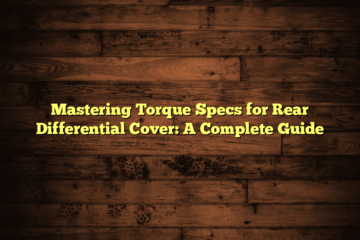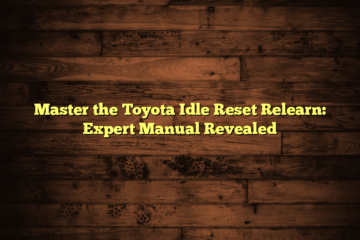Torque Spec for Tie Rod End: Mastering the Ultimate Power
The torque spec for a tie rod end is typically between 35-50 ft-lbs. Ensuring the proper torque specification for your tie rod end is crucial for the safety and optimal performance of your vehicle.
When tightening the tie rod end, it is recommended to use a torque wrench to achieve the specified range of 35 to 50 ft-lbs. This will help prevent over-tightening or under-tightening, which can lead to premature wear and tear or potential safety hazards.
By following the manufacturer’s recommendations for torque spec, you can maintain the integrity of the tie rod end and ensure a smooth driving experience.
The Importance Of Torque Spec
The torque spec for tie rod ends is crucial for ensuring the safety and stability of your vehicle. When properly torqued, tie rod ends play a significant role in maintaining steering stability, particularly during sudden maneuvers or emergency situations. Incorrect torque can lead to premature wear and tear, jeopardizing the overall performance and safety of the vehicle. It’s imperative to adhere to the manufacturer’s recommended torque specifications to avoid potential hazards and ensure optimal driving experience. Always consult the vehicle manual or a certified mechanic to determine the precise torque spec for tie rod ends, as it varies for different vehicle models. Regularly checking and adjusting the torque spec of tie rod ends is essential for preserving the integrity of the steering system and minimizing the risk of accidents.
Determining The Correct Torque Spec
Consult the manufacturer’s specifications to determine the correct torque spec for the tie rod end. Take into account the various factors that can affect the torque values. Make sure to follow the recommended torque settings to prevent any issues with the tie rod end.
Measuring Torque On Tie Rod Ends
To ensure proper installation and maintain the stability of your vehicle’s steering system, it is important to measure the torque on tie rod ends accurately. This can be done by using a torque wrench, which allows precise control over the torque applied to fasteners. Using such a tool ensures that the tie rod ends are tightened to the manufacturer’s recommended specification, preventing under or over-tightening.
When using a torque wrench, there are a few best practices to follow for optimal accuracy:
- Set the torque wrench to the desired value specified in your vehicle’s service manual.
- Apply consistent and steady pressure to the torque wrench while tightening the tie rod end.
- Make sure the torque wrench is properly calibrated and in good working condition.
- Repeat the tightening process if necessary to achieve the desired torque value.
- Avoid sudden movements or jerks while applying torque.
By adhering to these best practices, you can ensure that the tie rod ends are correctly tightened, promoting proper wheel alignment and reducing the risk of steering issues.
Consequences Of Incorrect Torque
Incorrect torque on tie rod ends can have serious consequences. It can lead to loose and unstable steering, affecting the vehicle’s handling and potentially causing accidents. Following the correct torque specification is essential for safe and reliable performance.
| Consequences of Incorrect Torque |
| Safety Hazards |
| Potential Damage to Steering Components |
Ensuring Longevity Of Tie Rod Ends
Regular Maintenance and Inspections
When maintaining your tie rod ends, it’s crucial to regularly check for any signs of wear and tear. Look out for loose connections and worn-out components that could indicate potential issues. Addressing these problems promptly can prevent further damage and ensure the longevity of your tie rod ends.
Mastering Torque Application
When tightening the tie rod end, it is crucial to follow the manufacturer’s specified torque specifications. Over-tightening can damage the component, while under-tightening can lead to loosening and steering issues. Expert mechanics emphasize the importance of using a torque wrench to achieve the precise torque. This practice ensures optimal performance and reduces the risk of premature wear and failure. For DIY enthusiasts, understanding the torque specs empowers them to perform maintenance tasks with confidence, fostering a deeper appreciation for the intricacies of automotive maintenance and repair.
Frequently Asked Questions
How Tight Do You Torque Tie Rod Ends?
Torque tie rod ends firmly following the manufacturer’s specifications for your specific vehicle model. Use a torque wrench and tighten in small increments until the desired torque setting is reached. Proper torquing ensures proper functioning and safety of the tie rod ends.
What Is The Torque Spec For A Tie Rod Nut?
The torque spec for a tie rod nut is typically around 45-55 ft-lbs. It’s crucial to follow manufacturer’s guidelines.
Do You Need A Torque Wrench For Tie Rods?
Yes, using a torque wrench is crucial for properly tightening tie rods. It ensures accurate torque levels for safety and performance.
Can You Over Tighten A Tie Rod End?
Yes, over-tightening a tie rod end can lead to damage and affect steering. It’s essential to follow manufacturer torque specifications.
What Is The Torque Spec For A Tie Rod End?
The torque specification for a tie rod end varies depending on the specific vehicle make and model. It is recommended to consult the vehicle’s repair manual for the accurate torque value.
Conclusion
Ensuring the proper torque spec for tie rod ends is crucial for vehicle safety. Follow manufacturer guidelines and avoid over or under tightening to prevent steering issues. Prioritize regular maintenance checks to keep your vehicle running smoothly and safely on the road.




